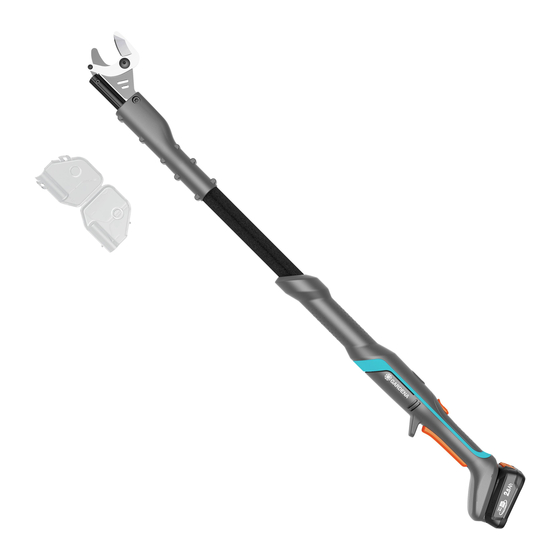Gardena HighCut 250/18V P4A Instrukcja obsługi - Strona 7
Przeglądaj online lub pobierz pdf Instrukcja obsługi dla Sprzęt do trawników i ogrodów Gardena HighCut 250/18V P4A. Gardena HighCut 250/18V P4A 13 stron. Battery pruning lopper/battery telescopic pruning lopper

When the battery charge indicator
manently green the battery is completely charged
(Charging time, see 7. TECHNICAL DATA).
4. Examine the charge status regularly while you charge.
5. When the battery
(B)
is completely charged, the battery
disconnected from the charger
3.2 Meaning of the indication elements:
3.2.1 Indication on the charger [ Fig. O3 ]:
Flashing of the Battery
The charging procedure is indicated by flashing of the battery charge
(Lc)
(Lc)
Charge Indicator
indicator
.
Note: The charging procedure is only possible when the battery
temperature is within the allowable charging temperature range,
see 7. TECHNICAL DATA.
Continuous Lighting
Continuous lighting of the battery charge indicator
of the Battery
the battery is fully charged or that the temperature of the battery is
(Lc)
Charge Indicator
not within the allowable charging temperature range and can therefore
not be charged.
When the battery is not inserted, continuous lighting of the battery
(Lc)
charge indicator
socket outlet and that the battery charger is ready for operation.
3.2.2 Battery charge status indication
[ Fig. O4 / O1 ]:
After starting the product, the battery charge status indication
is displayed for 5 seconds.
Battery charge status indication
(L1)
(L2)
(L3)
,
and
light green
(L1)
(L2)
and
light green
(L1)
lights green
(L1)
blinks green
If the LED
(L1)
blinks green, the battery must be charged.
(Wp)
If the error LED
is lighting or blinking
see 6. TROUBLESHOOTING.
3.3 Working position [ Fig. O5 ]:
v Hold the lopper with one hand on the upper gripping surface
with the other hand on the handle
3.4 To extend the telescopic tube (only for Art. 14774 / 14776)
[ Fig. O6 ]:
The telescopic tube
(2)
can be continuously extended by up to 40 cm.
DANGER!
Personal injury!
When extending the telescopic tube, the hand can be trapped between
the clamping sleeve and the orange nut if the lopper is held upwards
while doing so.
v Hold the lopper horizontally when extending the telescopic tube.
1. Loosen the orange nut
(12)
.
(2)
2. Extend the telescopic tube
3. Tighten the orange nut
(12)
again.
3.5 To tilt the cutting head [ Fig. O7 ]:
The cutting head
(3)
can be tilted in 20° increments from 0° to 60° in
4 positions.
(13)
1. Push the elbow joint
and adjust the cutting head
angle.
(3)
2. Let the cutting head
engage at the desired angle.
Make sure that the cutting head is engaged
3.6 To start the lopper [ Fig. O1 ]:
DANGER!
Risk of physical injury!
Risk of injury if the product does not stop when the start lever is
released.
(Lc)
at the charger lights per-
(B)
can be
(C)
.
(Lc)
indicates that
indicates that the mains plug is inserted in the
(P)
on the product
Battery charge status
67 – 100 % charged
34 – 66 % charged
11 – 33 % charged
0 – 10 % charged
(U)
(H)
.
to the desired length.
(3)
to the desired
v Do not bypass the safety devices or switches.
v For example do not attach the start lever to the handle.
3.6.1 To start the lopper:
The product is provided with a double safety device (start lever and safety
interlock) to prevent the product from being turned on by accident.
1. Put the batterie
(B)
2. Open the snap fit
blade.
3. Hold the lopper with one hand on the upper gripping surface
with the other hand on the handle
4. Slide the safety interlock
towards the handle
The blade closes and opens for initialisation.
The lopper is now ready for operation.
5. Slide the safety interlock
the handle
(H)
.
The lopper closes and remains closed until the start lever is released.
The battery charge level indicator
6. Release the safety interlock
3.6.2 Sleep-Timer-Funktion:
If the lopper has not been used for 15 minutes, the lopper switches off.
(P)
After that, the start lever must be pulled briefly towards the handle again
for re-initialisation.
3.7 To transport the lopper:
1. Release the start lever
The lopper stops.
2. Remove the battery.
3. Slide the protective cover over the blade.
4. MAINTENANCE
DANGER!
and
Cutting injury due to the blade!
Risk of cut injury due to accidental starting.
v Use gloves.
v Remove the battery.
v Slide the protective cover over the blade.
4.1 To clean the lopper:
DANGER!
Risk of physical injury!
Risk of injury and risk of damage to the product.
v Do not clean the product with water or with a water jet (in particular
high-pressure water jet).
v Do not clean with chemicals including petrol or solvents. Some can
destroy critical plastic parts.
The airflow slots must always be clean.
1. Clean the lopper with a damp cloth.
2. Clean the airflow slots with a soft brush (do not use sharp objects).
3. Clean the cutting head with a brush, if necessary.
4.2 To clean the battery and the battery charger:
The surface and the contacts of the battery and the battery charger must
be clean and dry before the battery is connected to the battery charger.
v Do not use running water.
4.2.1 To clean the battery:
No chemical substances may be used for cleaning the battery.
v Occasionally clean the ventilation slots and the terminals on the battery
with a soft, clean and dry brush.
into the battery holder
(D)
until it audibly engage.
(14)
of the protective cover and remove it from the
(H)
.
(10)
forward and pull briefly the start lever
(H)
.
(10)
forward and pull the start lever
(P)
is displayed for 5 seconds.
(10)
.
(11)
.
(U)
and
(11)
(11)
towards
13
